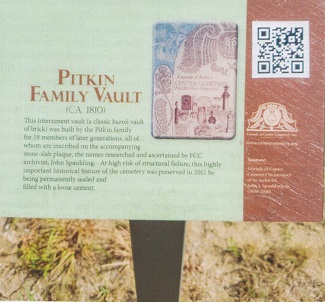
While reading the book, when you came to page 15 you immediately noticed that it's dominated by a picture
which looked like this:

The most distinguishing feature of the image is the QR (Quick Response) image associated with the Pitkin
Family Vault. It looks like it might be big enough to translate in, say, you smart phone; and so you tried
to read it to see what was to be found there.
Alas, when you tried this you found that either you couldn't read it or it came back with a message
essentially saying that the file was not available or was otherwise not usable.
In looking into why this was happening, we found that that QR image, as well as many others, had been
installed to facilitate walking tours of the Cemetery (Center Cemetery of East Hartford). However,
since the book's photo was taken, the Cemetery had undertaken a complete redesign of their web site ... which
meant that, among other things, the web addresses of the podcasts encoded in the QR images had all been
rendered unusable.
After conferring with one of the E.H. Public Library folks, we agreed we should create our own listing of the 30
short biographies or histories of the 30 subjects; as well as information about the Library and Cemetery, To
access that new page, please click 30 Biographies.
As Nick has pointed out on numerous occasions, having a knowledge of the past is critical in Archaeology,
whether engaging in an excavation going back millenia or, as was the case here, restoring a vault enclosing the
remains of those who came rather more recently before us. In fact, in such situations, it's all but mandatory.